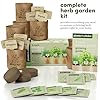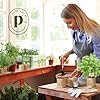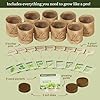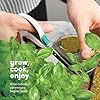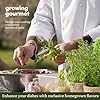Best Choice Products 6x3x2ft Outdoor Metal Raised Garden Bed, Deep Root Box Planter for Vegetables, Flowers, Herbs, and Succulents w/ 269 Gallon Capacity - Gray
21% OffSnugNiture 3 Pcs 2x2x1ft Round Galvanized Raised Garden Bed Kit Outdoor, Metal Planter Box for Planting Plants Vegetables, Brown
15% OffComposting is a simple and effective way to reduce food waste while creating nutrient-rich fertilizer for your garden. In this blog post, we’ll explore the joy of composting, including what it is, why you should do it, how to get started, maintaining your pile, and troubleshooting common problems. Let’s dive in!
Introduction to Composting: What It Is and Why You Should Do It
Composting is the process of breaking down organic matter such as food scraps, yard trimmings, and animal manure into a rich soil amendment called compost. This natural process involves the decomposition of organic materials by microorganisms such as bacteria, fungi, and worms. The end result is a dark, crumbly material that smells earthy and can be used to improve soil health, increase plant growth, and reduce erosion.
The Benefits of Composting for Your Garden and the Environment
There are many benefits to composting, both for your garden and the environment. Here are just a few:
Reduce Food Waste: By composting food scraps instead of throwing them away, you can significantly reduce the amount of waste sent to landfills.
Create Fertilizer: Compost is an excellent source of nutrients for plants, making it an ideal substitute for chemical fertilizers.
Improve Soil Health: Compost improves soil structure, increases water retention, and promotes beneficial microbes, all of which contribute to healthier plants.
Save Money: Composting is free and easy, allowing you to save money on expensive fertilizers and reduce your overall environmental impact.
How to Get Started with Composting: Choosing a Method That Works for You
Getting started with composting is easy, and there are several methods to choose from depending on your needs and preferences. Some popular options include:
Bin Composting: This method involves using a closed bin or container to collect food scraps and other organic materials. Bins come in various sizes and designs, so find one that works best for your space and needs.
Pile Composting: For those who want a more hands-off approach, pile composting may be the answer. Simply create a pile of organic materials in a sunny spot and let nature take its course.
Vermiculture Composting: Also known as worm composting, vermiculture involves using red wiggler worms to break down food scraps and other organics. This method is great for small spaces like apartments and balconies.
Maintaining Your Compost Pile: Tips for Keeping it Healthy and Productive
Once you have set up your compost system, it’s essential to keep it healthy and productive. Here are some tips to help you along the way:
Add Brown Materials: Browns include leaves, shredded paper, and dead plants. They provide carbon, which helps balance out the nitrogen in greens.
Add Greens: Greens include fruit and vegetable scraps, coffee grounds, and grass clippings. These items add nitrogen, which fuels the decomposition process.
Turn Your Pile: Turning your pile helps aerate it and distribute moisture evenly throughout. Aim to turn your pile once every two weeks.
Monitor Moisture Levels: Too much or too little moisture can slow down the decomposition process. Use your fingers to check the moisture levels regularly and adjust accordingly.
Troubleshooting Common Problems in Composting: Overcoming Challenges Along the Way
Even experienced composters sometimes face challenges when it comes to their piles. Here are some common issues and solutions:
Odors: If your pile smells bad, it could be due to excess moisture or not enough airflow. Try turning your pile more frequently or adding browns to absorb excess moisture.

Pests: Rodents and insects can be attracted to compost piles. Consider building a fence around your pile or using natural repellants like citrus peel or cayenne pepper.
Slow Decomposition: If your pile isn’t decomposing quickly enough, try adding more greens or turning it more often. You can also use a thermometer to ensure your pile is reaching optimal temperatures for decomposition.
In conclusion, composting is a fun and rewarding hobby that can benefit both your garden and the environment. Whether you’re new to composting or looking to refine your skills, remember to start small, experiment with different techniques, and don’t be afraid to ask for advice from fellow composters. Happy composting!
Related Content
- Spring Lane Capital Congratulates Atlas Organics, One of the Firm’s Inaugural Investments …
- The Best Vegetables to Grow in Your Backyard This Season
- Composting Now Required By California Law – YouTube
- Tips for composting in winter – Fulton Sun
- Finland dangles childcare, freebies and residency to lure green professionals of Japan …







































